- Home
- Iain M. Banks
Use of Weapons
Use of Weapons Read online
Acknowledgement
I blame Ken MacLeod for the whole thing. It was his idea to argue the old warrior out of retirement, and he suggested the fitness program, too.
Table of Contents
Slight Mechanical Destruction
Prologue
1: The Good Soldier
One
XIII
Two
XII
Three
XI
Four
X
Five
2: An Outing
IX
Six
VIII
Seven
VII
Eight
VI
Nine
V
3: Remembrance
Ten
IV
Eleven
III
Twelve
II
Thirteen
I
Fourteen
Epilogue
Zakalwes Song
STATES OF WAR
Slight Mechanical Destruction
Zakalwe enfranchised;
Those lazy curls of smoke above the city,
Black wormholes in the air of noontime's bright Ground Zero.
Did they tell you what you wanted to be told?
Or rain-skinned on a concrete fastness,
Fortress island in the flood;
You walked amongst the smashed machines,
And looked through undrugged eyes
For engines of another war,
And an attrition of the soul and the device.
With craft and plane and ship,
And gun and drone and field you played, and
Wrote an allegory of your regress
In other people's tears and blood;
The tentative poetics of your rise
From a mere and shoddy grace.
And those who found you,
Took, remade you
('Hey, my boy, it's you and us knife missiles now,
Our lunge and speed and bloody secret:
The way to a man's heart is through his chest!')
- They thought you were their plaything,
Savage child; the throwback from wayback
Expedient because
Utopia spawns few warriors.
But you knew your figure cut a cipher
Through every crafted plan,
And playing our game for real
Saw through our plumbing jobs
And wayward glands
To a meaning of your own, in bones.
- The catchment of these cultured lives
Was not in flesh,
And what we only knew,
You felt,
With all the marrow of your twisted cells.
Rasd-Coduresa Diziet Embless Sma da' Marenhide.
c/o SC, Year 115 (Earth, Khmer calendar).
Marain original, own translation. Unpublished.
Prologue
'Tell me, what is happiness?'
'Happiness? Happiness... is to wake up, on a bright spring morning, after an exhausting first night spent with a beautiful... passionate... multi-murderess.'
'... Shit, is that all?'
In his fingers, the glass lay like something trapped, sweating light. The liquid it contained was the same colour as his eyes, and swilled around lethargically in the sunlight under his heavy-lidded gaze, the glinting surface of the drink throwing highlights onto his face like veins of quick gold.
He drained the glass, then studied it as the alcohol made its way down his throat. His throat tingled, and it seemed to him that the light tingled in his eyes. He turned the glass over in his hands, moving it carefully and smoothly, seemingly fascinated by the roughness of the ground areas and the silky slickness of the unetched parts. He held it up to the sun, his eyes narrowing. The glass sparkled like a hundred tiny rainbows, and minute twists of bubbles in the slender stem glowed golden against the blue sky, spiralling about each other in a fluted double helix.
He lowered the glass, slowly, and his gaze fell upon the silent city. He squinted out over the roofs and spires and towers, out over the clumps of trees marking the sparse and dusty parks, and out over the distant serrated line of the city walls to the pale plains and the smoke-blue hills shimmering in the heat haze beyond, beneath a cloudless sky.
Without taking his eyes from the view, he suddenly jerked his arm, throwing the glass over his shoulder, back into the cool hall, where it vanished into the shadows and shattered.
'You bastard,' said a voice, after a slight pause. The voice sounded both muffled and slurred. 'I thought that was the heavy artillery. I nearly crapped myself. You want to see the place covered with shit?... Oh hell; I've bit the glass, too... mmm... I'm bleeding.' There was another pause. 'You hear?' The muffled, slurred voice increased a little in volume. 'I'm bleeding... You want to see the floor covered with shit and pedigree blood?' There was a scraping, tinkling sound, then silence, then, 'You bastard.'
The young man on the balcony turned away from the view over the city and walked back inside the hall, only a little unsteadily. The hall was echoing and cool. The floor was mosaic, millennia old, veneered over in more recent times with a transparent, scratch-proof covering to protect the tiny ceramic fragments. In the centre of the hall there was a massive, elaborately carved banqueting table, surrounded by chairs. Around the walls were scattered smaller tables, more chairs, low chests of drawers, and tall sideboards, all made from the same dark, heavy wood.
Some of the walls were painted with fading but still impressive murals, mostly of battlefields; other walls, painted white, supported huge mandalas of old weapons; hundreds of spears and knives, swords and shields, pikes and maces, bolas and arrows all arranged in great whorls of pitted blade like the shrapnel of impossibly symmetrical explosions. Rusting firearms pointing importantly at each other above blocked-off fireplaces.
There were one or two dulled paintings and frayed tapestries on the walls, but vacant spaces for many more. Tall triangular windows of coloured glass threw wedges of light across the mosaic and the wood. The white stone walls rose to red piers at the top, supporting huge black beams of wood that closed over the length of the hall like a giant tent of angular fingers.
The young man kicked an antique chair the right way up and collapsed into it. 'What pedigree blood?' he said. He rested one hand on the surface of the great table, and put the other up to and over his scalp, as if through thick long hair, though in fact his head was shaved.
'Eh?' said the voice. It appeared to come from somewhere beneath the great table the young man sat beside.
'What aristocratic connections have you ever had, you drunken old bum?' The young man rubbed his eyes with clenched fists, then, with his hands open, massaged the rest of his face.
There was a lengthy pause.
'Well, I was once bitten by a princess.'
The young man looked up at the hammer-beamed ceiling and snorted. 'Insufficient evidence.'
He got up and went out onto the balcony again. He took a pair of binoculars from the balustrade and looked through them. He tutted, swaying, then retreated to the windows, bracing himself against the frame so that the view steadied. He fiddled with the focus, then shook his head and put the binoculars back on the stonework and crossed his arms, leaning against the wall and gazing out over the city.
Baked; brown roofs and rough gable ends, like crusts and ends of bread; dust like flour.
Then, in an instant, under the impact of remembrance, the shimmering view before him turned grey and then dark, and he recalled other citadels (the doomed tent city in the parade-ground below, as the glass in the windows shook; the young girl - dead now - curled up in a chair, in a tower in the Winter Palace). He shivered, despit
e the heat, and shoved the memories away.
'What about you?'
The young man looked back into the hall. 'What?'
'You ever had any, umm, connections, with our, ah... betters?'
The young man looked suddenly serious. 'I once...' he began, then hesitated. 'I once knew some-one who was... nearly a princess. And I carried part of her inside me, for a time.'
'Say again? You carried...'
'Part of her inside me, for a time.'
Pause. Then, politely: 'Wasn't that rather the wrong way round?'
The young man shrugged. 'It was an odd sort of relationship.'
He turned back to the city again, looking for smoke, or people, or animals, or birds, or anything that moved, but the view might as well have been painted on a backdrop. Only the air moved, shimmering the view. He thought about how you could make a backdrop tremble just so to produce the same effect, then abandoned the thought.
'See anything?' rumbled the voice under the table.
The young man said nothing, but rubbed his chest through the shirt and open jacket. It was a general's jacket, though he wasn't a general.
He came away from the window again and took up a large pitcher that stood on one of the low tables by the wall. He lifted the pitcher above his head and carefully up-ended it, his eyes closed, his face raised. There was no water in the pitcher, so nothing happened. The young man sighed, gazed briefly at the painting of a sailing ship on the side of the empty jug, and gently replaced it on the table, exactly where it had been.
He shook his head and turned away, striding up to one of the hall's two giant fireplaces. He hauled himself up onto the broad mantelpiece, where he stared intently at one of the ancient weapons mounted on the wall; a huge wide-mouthed gun with an ornamental stock and open firing mechanism. He started trying to prise the blunderbuss away from the stonework, but it was too firmly attached. He gave up after a while and jumped to the floor, staggering a little as he landed.
'See anything?' said the voice again, hopefully.
The young man walked carefully from the fireplace towards one corner of the hall, and a long, ornate sideboard. Its top was covered by a profusion of bottles, as was a considerable area of the nearby floor. He searched through the collection of mostly broken, mostly empty bottles until he found one that was intact and full. When he found it he sat carefully on the floor, broke the bottle open against the leg of a nearby chair, and emptied into his mouth the half of the bottle's contents that hadn't spilled over his clothes or splashed across the mosaic. He coughed and spluttered, put the bottle down, then kicked it away under the sideboard as he got up.
He made his way towards another corner of the hall, and a tall pile of clothes and guns. He picked up a gun, untangling it from a knot of straps, sleeves and ammunition belts. He inspected the weapon, then threw it down again. He swept several hundred small empty magazines aside to get at another gun, but then discarded that one too. He picked up two more, checked them and slung one round his shoulder while placing the other on a rug-covered chest. He went on through the weapons until he had three guns slung about him, and the chest was nearly covered with various bits and pieces of hardware. He swept the gear on the chest into a tough, oil-stained bag and dumped that on the floor.
'No,' he said.
As he spoke, there was a deep rumble, unlocated and indeterminate, something more in the ground than in the air. The voice under the table muttered something.
The young man walked over to the windows, setting the guns down on the floor.
He stood there a while, looking out.
'Hey,' said the voice under the table. 'Help me up, will you? I'm under the table.'
'What're you doing under the table, Cullis?' said the young man, kneeling to inspect the guns; tapping indicators, twisting dials, altering settings and squinting down sights.
'Oh, this and that; you know.'
The young man smiled, and crossed to the table. He reached underneath and with one arm dragged out a large, red-faced man who wore a field-marshal's jacket a size too big for him, and who had very short grey hair and only one real eye. The large man was helped up; he stood carefully, then slowly brushed one or two bits of glass off the jacket. He thanked the young man by slowly nodding his head.
'What time is it, anyway?' he asked.
'What? You're mumbling.'
'Time. What time is it?'
'It's day time.'
'Ha.' The large man nodded wisely. 'Just as I thought.' Cullis watched the young man go back to the window and the guns, then heaved himself away from the great table; he arrived, eventually, at the table holding the large water-pitcher which was decorated with a painting of an old sailing ship.
He lifted the pitcher up, swaying slightly, turned it upside down over his head, blinked his eyes, wiped his face with his hands and flapped the collar of his jacket.
'Ah,' he said, 'that's better'.
'You're drunk,' said the young man, without turning away from the guns.
The older man considered this.
'You almost manage to make that sound like a criticism,' he replied, with dignity, and the tapped his false eye and blinked over it a few times. He turned as deliberately as possible and faced the far wall, staring at a mural of a sea battle. He fixed on one particularly large warship portrayed there and seemed to clench his jaw slightly.
His head jerked back, there was a tiny cough and a whine that terminated in a miniature explosion; three metres away from the warship in the mural, a large floor-standing vase disintegrated in a cloud of dust.
The large grey-haired man shook his head sadly and tapped his false eye again. 'Fair enough,' he said, 'Im drunk.'
The young man stood up, holding the guns he had selected, and turned to look at the older man. 'If you had two eyes you'd be seeing double. Here; catch.'
So saying, he threw a gun towards the older man, who stretched out one hand to catch it at just the same time as the gun hit the wall behind him and clattered to the floor.
Cullis blinked. 'I think,' he said, 'I would like to go back under the table.'
The young man came over, picked up the gun, checked it again, and handed it to the older man, wrapping his large arms around it for him. Then he manoeuvred Cullis over to the pile of weapons and clothes.
The older man was taller than the young man, and his good eye and the false eye - which was in fact a light micro-pistol - stared down at the young man as he pulled a couple of ammunition belts from the floor and slung them over the older man's shoulders. The young man grimaced as Cullis looked at him; he reached up and turned the older man's face away, then from a breast pocket in the too-big field-marshal's jacket extracted what looked like - and was - an armoured eye-patch. He fitted the strap carefully over the taller man's grey, crew-cut head.
'My god!' Cullis gasped, 'I've gone blind!'
The young man reached up and adjusted the eye patch. 'Your pardon. Wrong eye.'
'That's better.' The older man drew himself up, taking a deep breath. 'Where are the bastards?' his voice was still slurred; it made you want to clear your throat.
'I can't see them. They're probably still outside. The shower yesterday is keeping the dust down.' The young man put another gun into Cullis' arms.
'The bastards.'
'Yes, Cullis.' A couple of ammunition boxes were added to the guns cradled in the older man's arms.
'The filthy bastards.'
'That's right, Cullis.'
'The... Hmm, you know, I could do with a drink.' Cullis swayed. He looked down at the weapons cradled in his arms, apparently trying to puzzle out how they had appeared there.
The young man turned round to lift more guns from the pile, but changed his mind when he heard a large clattering, breaking noise behind him.
'Shit,' Cullis muttered, from the floor.
The young man went over to the bottle-strewn sideboard. He loaded up with as many full bottles as he could find and returned to where Cullis was snoring
peacefully under a pile of guns, boxes, ammunition belts and the dark-splintered remains of a formal banqueting chair. He cleared the debris off the older man and undid a couple of buttons on the too-large field-marshal's jacket, then stuffed the bottles inside, between jacket and shirt.
Cullis opened his eye and watched this for a moment. 'What time did you say it was?'
He buttoned Cullis' jacket up halfway. 'Time to go, I think.'
'Hmm. Fair enough. You know best, Zakalwe.' Cullis closed his eye again.
The young man Cullis had called Zakalwe walked quickly to one end of the great table, which was covered by a comparatively clean blanket. A large, impressive gun lay there; he picked it up and returned to the large, unimpressive form snoring on the floor. He took the old man by the collar and backed off towards the door at the end of the hall, dragging Cullis with him. He stopped to pick up the oil-stained bag full of weaponry he'd sorted out earlier, slinging that over one shoulder.
He'd dragged Cullis halfway to the door when the older man woke up, and with his one good eye fixed him with an upside-down bleary stare.
'Hey.'
'What, Cullis?' he grunted, heaving him another couple of metres.
Cullis looked round the quiet white hall as it slid past him. 'Still think they'll bombard this place?'
'Mm-hmm.'
The grey-haired man shook his head. 'Na,' he said. He took a deep breath. 'Na,' he repeated, shaking his head. 'Never.'
'Cue incoming' the young man muttered, glancing around.
Nevertheless the silence continued as they reached the doors and he kicked them open. The stairs that led down to the rear entrance hall and out into the courtyard were of brilliant green marble edged with agate. He made his way down, armaments and bottles clinking, gun bumping, dragging Cullis down step after step, the big man's heels thumping and scraping as he went.
The old man grunted with each step, and once mumbled. 'Not so damn hard, woman.' The young man stopped at that point and looked at the old man, who snored and dribbled saliva from the corner of his mouth. The young man shook his head and continued.
On the third landing he stopped for a drink, allowing Cullis to snore on, then felt sufficiently fortified to continue the descent. He was still licking his lips and had just grabbed Cullis' collar when there came an increasing, deepening, whistling noise. He dropped to the floor and hauled Cullis half on top of him.

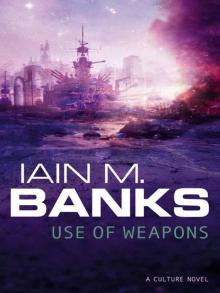 Use of Weapons
Use of Weapons Transition
Transition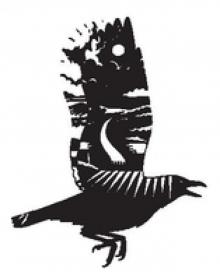 The Crow Road
The Crow Road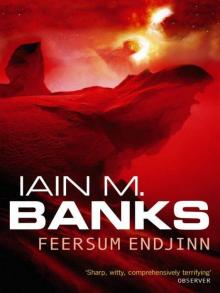 Feersum Endjinn
Feersum Endjinn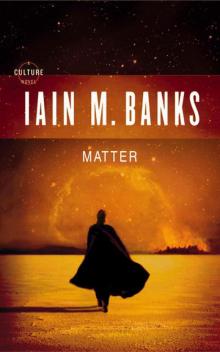 Matter
Matter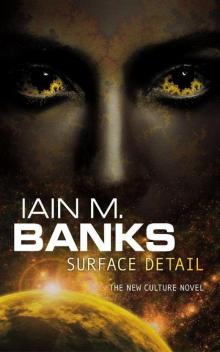 Surface Detail
Surface Detail The Wasp Factory
The Wasp Factory Consider Phlebas
Consider Phlebas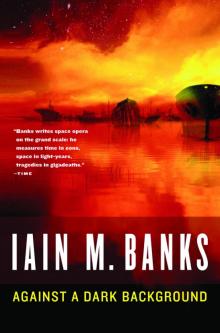 Against a Dark Background
Against a Dark Background Excession
Excession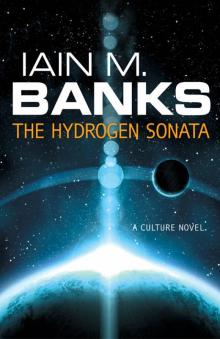 The Hydrogen Sonata
The Hydrogen Sonata The Algebraist
The Algebraist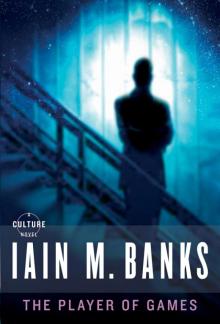 The Player of Games
The Player of Games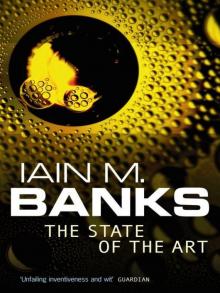 The State of the Art
The State of the Art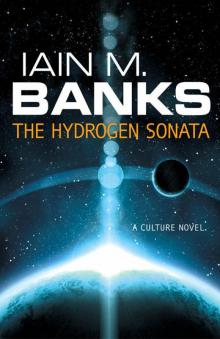 The Hydrogen Sonata c-10
The Hydrogen Sonata c-10 Excession c-5
Excession c-5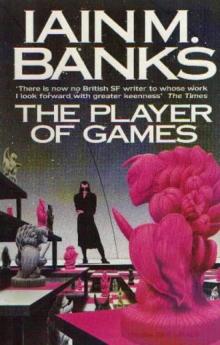 The Player of Games c-2
The Player of Games c-2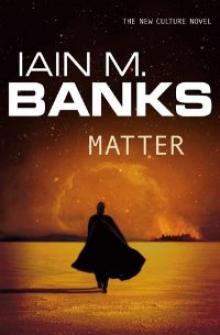 Matter c-8
Matter c-8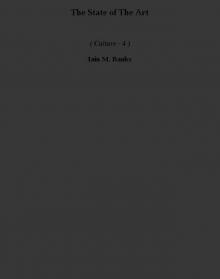 The State of The Art c-4
The State of The Art c-4 Look to Windward c-7
Look to Windward c-7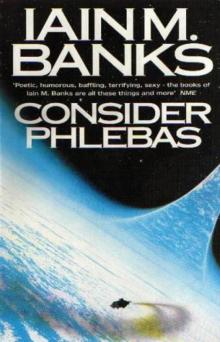 Consider Phlebas c-1
Consider Phlebas c-1